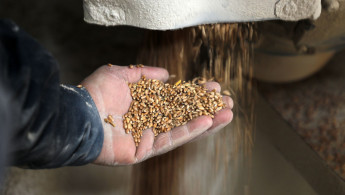Palestinians in Gaza Strip hit by surging food, fuel prices amid devastating Israeli siege
Food and fuel in the besieged Gaza Strip have witnessed a surge in prices, much of it imported from Egypt and Israel.
Flour, sugar, rice, wheat, chicken, vegetables, and fuel are among the staples that witnessed a shocking increase, hitting Gaza's poorest the hardest.
Mohammed Doghmush, a resident of Gaza City, said he was "shocked" that the price of 30 kilograms of flour went up from $7.7 US dollar to $12.4 US dollar.
The 45-year-old father-of-six told The New Arab that he needs at least 90 kilos of flour to feed his family and the near-double in price will hit his income hard.
"I am a vendor seller and I can difficulty gain about $6 a day, which even cannot help me keep my family afloat. So, what should I do at such high prices," the man complained.
Fatima Al-Shaer, another resident of Gaza, said she was forced to buy smaller quantities than her usual needs due to inflation.
In the previous months, the mother-of-three said that one kilogram of tomatoes cost her $1 but it is now being sold for $2.50.
In addition, the price of a kilogram of chicken went up from $2.3 to $3.5 US dollars.
"None of the citizens can bear this outrageous price tag," Shaer, said.
She urged the Hamas-run local authorities to adjust prices in local markets, especially before the start of the holy month of Ramadan.
The Hamas-run ministry of economy said that the rise in prices was not limited to the Gaza Strip, but was being experienced across the globe due to the Ukrainian-Russian conflict and the instability of the dollar's exchange against the Israeli shekel.
Osama Nofal, an official at the ministry, told The New Arab that he was closely following reports of the increase of the food and fuel prices, adding that his ministry was working to prevent merchants from exploiting customers and profiteering.
More than half of Gazans live under poverty line due to Israeli blockade: NGO report https://t.co/YlA7ViIznJ
— The New Arab (@The_NewArab) January 25, 2022
According to the Euro-Mediterranean Human Rights Monitor, about 1.5 million Gazans have become impoverished amid the Israeli siege.
In 2006, Israel imposed a blockade on the coastal enclave after Hamas, a Palestinian Islamist group, won a general election in the territory.
Their electoral success resulted in clashes with rivals from Fatah, the movement that runs the Palestinian Authority (PA).
Israel tightened its blockade against Gaza after Hamas forcibly took over the territory from Fatah in 2007.





 Follow the Middle East's top stories in English at The New Arab on Google News
Follow the Middle East's top stories in English at The New Arab on Google News


